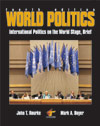The focus of this chapter is the notion that world politics can be conducted with a greater emphasis on following international law and attempting to ensure justice. This is an alternative approach to national diplomacy and its power-based pursuit of self-interest discussed in the last chapter. It would be naive to think that the actors in any system would not be motivated in significant part by what is good for themselves. Most individuals and groups in domestic political systems emphasize their own welfare, just as states do in the international system. There are differences, however, in how domestic and international systems work. What is of interest here is the way domestic systems, compared to the international system, restrain the pursuit of self-interest.
Legal systems are one thing that helps limit the role of pure power in a domestic system. The Fourteenth Amendment to the U.S. Constitution, for example, establishes "the equal protection of the laws" as a fundamental principle. Certainly, powerful individuals and groups have distinct advantages in every domestic system. Rules are broken and the guilty, especially if they can afford a high-priced attorney, sometimes escape punishment. Still, in the United States, laws cannot overtly discriminate and an attorney is provided to indigent defendants in criminal cases. Thus, the law evens the playing field, at least sometimes.
Morality is a second thing that restrains the role of power in domestic systems. We are discussing what is "right" here, not just what is legal. Whether the word is moral, ethical, fair, or just, there is a greater sense in domestic systems than there is in the international system that appropriate codes of conduct exist, that the ends do not always justify the means, and that those who violate the norms should suffer penalties. Surely, there is no domestic system in which everyone acts morally toward everyone else. Yet the sense of morality and justice that citizens in stable domestic systems have does have an impact on their behavior.
Most importantly, what all this means is that politics does not have to work just one way. There are alternatives. Idealists envision and prescribe a system of international law that covers more and more aspects of international interchange and that contains strong mechanisms to resolve disputes and enforce the law. Realists do not believe that this goal is attainable and suspect that national states will follow the dictates of national interest, ignore the law, and act in a self-serving way, especially on national security and other vital matters. Idealists reply that they are not so foolish as to imagine a perfect world, only a better one. |



 2002 McGraw-Hill Higher Education
2002 McGraw-Hill Higher Education